Peter MALONE
Saturday, 18 September 2021 19:51
Eyes in the Night
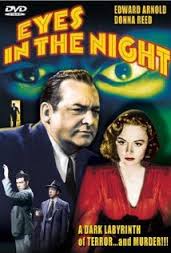
EYES IN THE NIGHT
US, 1942, 81 minutes, Black and white.
Edward Arnold, Anne Harding, Donna Reed, Alan Jenkins, Horace Mc Nally,
Directed by Fred Zinemann.
Eyes in the Night is a short supporting feature, a detective thriller as well as a wartime thriller with Nazi agents operating in Washington. It is also one of the early feature films of the celebrated director Fred Zinemann, was to win Oscars as best director for From Here to Eternity, 1953, and A Man for all Seasons, 1966. He was to direct a wide range of films from High Noon to Oklahoma to The Nun’s Story.
Edward Arnold portrays a blind police officer, with his own guide dog, Friday. He is approached by an old friend, Anne Harding. Her husband is an inventor, completing his work, about to test it out. He has a daughter from a previous marriage, a precocious young girl played by Donna Reed (Zinemann was to direct to a Best Supporting Actress Oscar in From Here to Eternity). She is infatuated with an older actor who had previously been a suitor for her stepmother.
The actor is found murdered and the mother under suspicion. The blind detective, assisted by his humorous sidekick, Allen Jenkins, finds that the body is missing, but the rug is returned by Stephen Mc Nally (here, Horace Mc Nally). He rings his wife at the home of the inventor which leads to the unmasking of a Nazi ring, led by the director of a play that the daughter is appearing in, her assistant is the house Butler, with a number of thugs in attendance.
The detective impersonates an old uncle, infiltrating the house, getting the leads, pretending to be drunk, boisterously playing the piano, and spoiling all the plans. There are some pleasant seriousness and comedy with Friday, the dog, going to the rescue.
1. A small entertaining thriller, detective work, spy rings in World War II?
2. Black-and-white photography, musical score, use of the piano? The early work of the director?
3. The title, the irony with the blind detective – able to read in bed with the lights out! The contrast with the Nazi ring and the spies’ eyes in the night?
4. The establishment of the character of Mac, his gymnastic manipulations for the police, his sidekick suffering? The servant in the house, his clash with Friday? Harding come to visit? His receiving her, happy memories of the past? The explanation of the situation, her stepdaughter and hostility, her husband and his inventions? The husband going out on the trial run, the arrival of the actor, the girl going out with him, Harding deciding not to accompany her husband? Going to the theatre, the confrontation with the actor and warning him?
5. Harding, going to the actor’s house, finding the dead body, the girl accusing her? Blackmailing her stepmother to leave the house while she kept quiet?
6. Mac, the sidekick, going to the house, the sidekick giving all the descriptions for the blind man? The fact that there was no body? hearing someone come, hiding, Gabriel and his bringing the rug back, his wife at Harding’s house? Their interrogation of him?
7. Mac, his decision to go to the house, pretending to be the grand uncle, getting in, taking over, his gruff manner, playing the piano, the drink and drug in the drink, meeting everyone, interactions with the butler, with the maid, the note about her husband, her wanting to cooperate, her fears, her being killed and her body dumped? The other thugs? His not going to bed, wandering the house, playing the piano, singing, disturbing everyone, thwarting the plans to rob the safe?
8. The theatre director, her late rehearsal, it emerging that she was the leader of the group, getting the daughter out of the house? Allowing the daughter to go, her asking to stay the night? The clashes about authority with the butler? Her being in charge? Having to cope with Mac and his antics? The butler having to deal with him as well? Harding and her playing the part? The daughter and her anger at finding him in the house?
9. The inventor, completing his test, success, the plan to submit the details to the government? The deadline for the Nazis to rob the safe?
10. The detective, the note with Friday, being put in the basement, the trick with the cards and knocking out his guardian, the confrontation with the butler, breaking the globe, in his element in the dark? Shootings?
11. The scientist and his refusal to give the number for the safe, the threat to his daughter, refusing to give the information, the detective getting him to stall?
12. Gabriel arriving, the lies, the group realising the detective had been deceiving them?
13. Friday, his race home, the distraction and flirting with the other dog, in the basement, getting out, crashing through the window, freeing the assistant?
14. The final confrontation, the arrival of the police, the daughter punching this theatre director, and everything resolved? – And the daughter going out with the detective on a date! And the end with the two dogs getting together!!
Published in Movie Reviews
Published in
Movie Reviews
Tagged under
Saturday, 18 September 2021 19:51
Night Listener, The
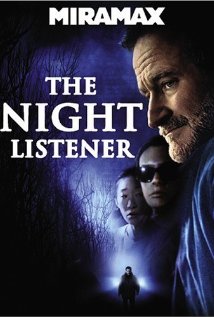
THE NIGHT LISTENER
US, 2006, 91 minutes, Colour.
Robin Williams, Toni Collette, Bobby Cannavale, Rory Culkin, Joe Morton, Sandra Oh.
Directed by Patrick Stettner.
The Night Listener is something of a short story on film. The original novel and collaboration on the screenplay was from Amistead Maupin author of the well-known Tales of the City – and this film has some similar themes.
Robin Williams portrays a radio personality, Gabriel Noone, who does a storytelling program from 11 PM to midnight, Noone at Night, and who is sent a manuscript by publisher, Joe Morton, which could be a basis for a story on air. Meanwhile Noone’s life is in crisis, his partner leaving him after becoming free from AIDS, Bobby Cannavale, and difficulties with his contracts for his program.
The story concerns a boy who was abused by his parents, a brief flashback for the film, but who is being looked after by a social worker, Donna, Toni Collette. He speaks by phone to both of them, the boy being rather ill and having to go to hospital. He decides to go out to meet the boy, encounters Donna, who is blind. She has answer for every question – and Noone’s friend and former partner has suggested that they are one and the same person. This has an effect on Noone as he tries to understand, even to the danger of Donna struggling with him on a highway with a truck approaching.
Noone returns to New York, still trying to solve the puzzle, as well as his emotional conflicts. Donna phones to say she is at the airport in New York, leaving before he arrives, but there is a cassette which shows pictures of the boy.
The film endds surprisingly with a sighted Donna intending to buy a home and telling a story about her son, the infection in his leg and his amputation.
And unusual atmospheric story, an intense performance by Robin Williams, a clever performance by Toni Collette, and directed by Patrick Stettner who also directed the interesting The Business of Strangers.
1. The impact of the film, as a drama, touches of thriller, the mystery?
2. The New York settings? Apartments, radio studios, the streets and cafes, motels? The contrast with Wisconsin, the dinor, the home, the highway and the oncoming truck? The finale with the new home? The atmospheric musical score?
3. The title? Donna and her listening, Pete and his listening? Noone’s program?
4. Hearing Noone in action, his show, the stories? His voice over and introducing the new story? The publisher, friendship, giving him the manuscript, the effect on Noone?
5. The visuals of Pete, the flashbacks to the abuse sequence in his past, at home with Donna, in the hospital? The phone calls, talking with both Donna and Pete?
6. Jess, recovering from AIDS, his relationship with Noone, his leaving, a new lease on life, wanting new friends, his meeting with Noone, the discussions about Pete and Donna, Jess suggesting they were one and the same person, listening to the voice and into nations? The later meetings? Their personal discussions about their future and friendship? Jess’s new partner? His still holding to the theory that Pete and Donna were the same person? And that the tape could be of someone else?
7. Anna, tidying the house with Noone, confidante, discussing the issues, the personal ones, Donna and Pete?
8. Noone and his going to visit, to Wisconsin, the flight, the search, the diner, meeting Donna? The invitation to the house, her being blind? Her consciousness of Noone’s presence? Pete in the hospital, her various stories, Noone’s challenges, having an answer for everything? Her condemning him for not believing her? The road, the oncoming truck, her being stranded, helpless, his dragging her away, their almost being killed?
9. The phone call, the many calls, at dinner with Ashe and his friends, his losing his temper?
10. Donna saying she was a motel near the airport, leaving before Noone arrived, leaving the cassette? His watching the cassette, its seemingly being true, the picture of Pete?
11. Noone, left in his bewilderment? The mystery?
12. Donna, sighted, different hairstyle, manner, discussions with the realtor, explanation of Pete, the infection and his amputation? Taking the house?
13. The open-endedness of the finale?
Published in Movie Reviews
Published in
Movie Reviews
Tagged under
Saturday, 18 September 2021 19:51
Caligula
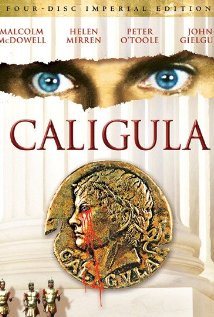
CALIGULA
Italy, 1979, 145 minutes, Colour.
Malcolm Mc Dowell, Teresa Ann Savoy, Helen Mirren, Peter O’ Toole, John Gielgud, John Steiner, Adriana Asti, Donato Placido.
Directed by Tinto Brass.
Caligula is often described as one of the most controversial films for public release. It was finished in 1979 but work continued on the film, especially by its producer, Bob Guccione from Penthouse, and there was some years before it was released worldwide.
There was a strong response at the time of its release to Bob Guccione and his Penthouse background, especially when it became known that he and an Italian associate had directed some more explicit sequences with some hard-core touches which were inserted into the film. Director Tinto Brass had a reputation for explicit sexuality in films, with the touch of the pornographic. His films include Salon Kitty and The Key. However, he was fired from this film and, while the majority of the film is his, its impact is affected by the contribution of Guccione and his associates.
On its release, the principal cast wanted to be dissociated from the film and made protests. There was a credit that the film was based on an original screenplay by Gore Vidal. Vidal asked that his name be removed and sued the company for some damages. Nevertheless, the principal stars are to be seen in some graphic sequences and explicit sequences.
For video release, the film was edited, with a lot of the explicit material being taken out – with the result that the standard video and early DVD release ran with an hour taken out of the film.
Watching the film in the 21st century is probably quite a different experience from watching it in the 1980s, given the changes in community standards, what is permissible on screen and what is not, and audience ability to deal with this kind of material rather than being apprehensive as so many were when the film was released. With so much pornography and violence easily available on the Internet, Caligula is certainly much less in depiction and impact than much of that material more readily available than before. Which means that audiences might be able to leave aside the Penthouse excesses, even the excesses of Tinto Brass, and appreciate some of the more serious strands and performances as well as explorations of Roman history. Not that this is the last word on the era – the BBC’s famous series, I, Claudius, would still be a standard – with Derek Jacobi as Claudius and John Hurt as Caligula.
The film begins with a statement is this pagan Rome – although some commentators say that adultery was a punishable crime and that orgies were not as prevalent as this film seems to make out. Nevertheless, it was a time of some decadence, a great deal of violent cruelty, especially the internecine killings within the ruling families. There is also a quotation from the gospel of Saint Mark about what does it profit to gain the whole world to lose one’s soul…
The film opens with a coin image of Caligula, eventually with blood coming from his eye. And the date of the action is 37 A.D. – 41 A.D.
The film shows Caligula as mad, crude, cruel, sexually voracious, of both nymphs and satyrs as he says. He is played by Malcolm Mc Dowell, more than a decade after his pivotal role in if… and eight years after A Clockwork Orange. He seems an exact piece of casting, relishing his excesses on screen, proclaiming that he was a God, killing discriminately and indiscriminately to be rid of rivals, eventually suffering the inevitable coup and death by an army general.
The film opens with Caligula and the relationship, sexual, with his sister Drusilla (Teresa Ann Savoy) – something which continues throughout the film, she having quite an influence on him as well as the passionate and explicit encounters, including a birth sequence. While Caligula has his eye on a range of women, especially on the wife of his trusted lieutenant, Macro – who eventually does fall foul of him and is cruelly executed – his eye is on Caesonia, Helen Mirren, who shares in his erotic and bloodthirsty desires.
Where the film is interesting is in its rendition of the history. In the first third of the film, there is a focus on the Emperor, Tiberius, played to effect by Peter O’ Toole, with make up indicating that physically as well as morally, he was rotting. There is also a typically dignified performance by John Gielgud as Nerva, enemy of the Emperor who chooses a dignified suicide, at his own time, for his death defiance of the Emperor.
There is a prolonged sequence where Caligula chooses the right of the bed to disrupt and destroy a virginal couple, callously tormenting and raping the bride, taunting and raping the bridegroom – whom he later murders in a scene of some sadism.
There is a continual atmosphere of orgies – whether the intention of Tinto Brass or the intention of the Penthouse directors, interspersed with scenes which are obviously edited in, especially several woman on woman sequences for Penthouse titillation. There is also an extended sequence where Caligula wanders the city disguised and views the ugliness.
Of interest are the sets, highly stylised, limited to sound stages, filmed with striking colours.which give the film a lot of atmosphere. Atmosphere is also provided by the musical background from familiar themes from Katchaturian and Prokofiev.
Sometimes there are scenes of state, the signing of documents, a visit to the Senate – which ends in the senators agreeing to Caligula being a God, with status for his favoured horse, and Caligula taunting the senators by baahing and their following suit, a cloth coming down on them and an extended sequence where he turns the Senate into a brothel, gathering the wives of the senators and acting as the master of the brothel urging customers on.
Caligula cannot necessarily be recommended for viewing – but it would seem that several decades after its initial release controversy, many audiences could deal with it and note the sections which are of value.
Published in Movie Reviews
Published in
Movie Reviews
Tagged under
Saturday, 18 September 2021 19:51
Jack/ 1996
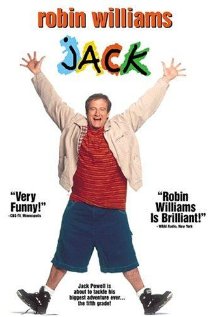
JACK
US, 1996, 113 minutes, Colour.
Robin Williams, Diane Lane, Brian Kerwin, Jennifer Lopez, Bill Cosby.
Directed by Francis Ford Coppola.
For a while in the 80s, we had a number of comedies where boys finished up in men's bodies, the best of which was Big with Tom Hanks. Now Robin Williams has his chance to do a Big turn, a ten year old in the body of a man of forty. However, the film is more serious in intent.
Jack has a rare disease that means that his body grows four times faster than normal. His parents keep him at home and educate him with a tutor (Bill Cosby). But Jack does not want to be alone; he wants to go to school. The film shows us what happens: the curiosity and cruelty of the children, the making of friendships, the oddity of looking four times older than you are.
At the end the film has some sentimental speeches (and critics have been severe on the emotional tone of the film). But, if we were in the same situations, how would we respond? Feelingly? Unfeelingly? Robin Williams gives one of his more controlled performances which makes his Jack more believable. The film is directed by Francis Ford Coppola and one of his earlier films sums up this one, One from the Heart.
1. The title, the focus on Jack, his physical condition, the child and an adult body, his parents and their care, the nature of parenting this child, the tutor the education, the risk in the boy’s going to school, the other children, taunts, friendship, the support of teacher?
2. The American city, homes, schools, situations, sequences in bars, the graduation? The musical score?
3. Robin Williams, his screen presence, his skill in performing unusual roles? The blend of comedy and pathos?
4. The condition, the facts, the explanations, the role of the doctors, Jack’s birth, his parents, the diagnosis, seeing him at ten, ageing at four times the rate of his age, physical changes, psychological aspects of a 10-year-old in such a body? The tutor and the bond? The treehouse, play, too many, the collapse of the treehouse, the final tutoring, the goals of education? Playing with his parents and their delight in their boy?
5. School, his wanting to go, the decision, his loneliness at home, the strong bond with each of his parents, their care and communication? His mother taking to school, the fuss? The principal introducing him to the teacher? Miss Marquez, the humour, too big to the desk, the yard, the boys and the gangs, the basketball, the two girls and their interrogating him as a freak? Miss Marquez and her care?
6. Playing basketball, wanting baskets at home, his skill, size, winning? The bonds with the group of boys, led by Louis? The girls and their curiosity turning to friendship? Everyone at the treehouse? His buying the sex magazines for the boys? The collapse of the treehouse?
7. The boys themselves, Louis, leader, his eccentric mother, her arrival, Jack pretending to be the principal, improvising, the effect?
8. His relationship with Miss Marques, the serious invitation to take her out, the effect on her, having to be firm, his disappointment?
9. His collapse at school, the pressure, the doctor’s reaction, his being taken out of school, his watching the children come to the house, his mother sending them away?
10. His going to the bar, the encounter with Paul, the friendship, the talk, the drinks? Dolores seeing him, her presuming he was the principal, talking, the dance, is imitating the others, her response? The accident, knocking the man, the build-up to the fight? Dolores taking him home?
11. The dramatics and the emotions, Jack coping with his body, the shaving sequences, growing his beard, people thinking he was the giant? The psychological repercussions and demands?
12. The seven years passing, his continuing at school, his being older, looking older, the crowd, his valedictory speech, his perspectives on life and its being short?
13. The finale, with the kids, his being accepted, having a happy life, the pride of his parents, the tutor?
Published in Movie Reviews
Published in
Movie Reviews
Tagged under
Saturday, 18 September 2021 19:51
Happy Years, The
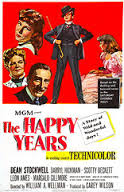
THE HAPPY YEARS
US, 1950, 110 minutes, Colour.
Dean Stockwell Daryl Hickman, Scotty Beckett, Leon Ames, Margalo Gilmore, Leo G. Caroll.
Directed by William A.Wellman.
The Happy Years is one of those stories about 19th-century education in boys’ boarding schools – a bit like Tom Brown’s Schooldays, and not, particularly because it is so American.
The film was directed by William G.Wellman, who directed the first Oscar-winning film, Wings, He had an aviation background in World War I and moved into films, often having an aviation theme like The High and the Mighty as well as Lafayette Escadrille. He also directed many westerns as well as directing the first version of A Star is Born.
The film was quite colourful, humorous in its tone, offering the picture of the ideal affluent 19th-century family, the place of the boarding school in developing character, classes, with an emphasis on Latin, as well as American football and rivalry with other colleges.
The film is a star vehicle for Dean Stockwell who had appeared in a number of top-ranking films including The Green Years and The Boy with Green Hair. After he finished his education, he continued to be an actor for the next 60 years.
1. A 19th-century story, a piece of Americana? Family, education, growing up, responsibility?
2. The title, based on a group of short stories about Lawrenceville? The role of school, boarding school, all boys school, clashes, discipline, sport, classes, Latin, the bonds between the boys, growth of responsibility and honour, not cheating, collaboration and growing up?
3. The director, his aviation background, westerns and dramas – this film as being quite different? The credits, the fashion sketches, indication of the period, the late 19th century, sport…? Costumes and decor? The musical score?
4. The parents, father running the paper, writing the article about his son, his son’s pranks and lack of discipline, the phone calls to the office, father going home, the boy being expelled? Painting the horse green, blowing up the building? The threats? John and his relationship to his parents? To his brother? The clashes with his sister? Defiant and smart?
5. John, going to school, driving in the carriage, making up stories, his parent’s death, the teacher listening, John and his bravado, the horses and the carriage, promising to ginger up the school?
6. Meeting the boys, bowing and being polite, his room, his roommate, Tough and the other boys?
7. His attitude of defiance, fighting, falling back into the water many times, the continued feud with Tough? Sport, the Roman and his attitude towards John, carrying the water, John refusing, the tackling, the teacher’s intentions?
8. Classes, gerunds and gerundives, the texts, reading and translating? The Great Big Man and his intelligence, his help?
9. The promise of the pancake house to give pancakes all day if the record was broken? John setting up the Great Big Man, his eating more than the record, his getting a new name Hungry, the owners, supplying the pancakes, the whole school rushing to the house?
10. Sport, American football, John small, the squad, invited to play, the relationship of success in sport to studies? The groups in the houses, John and his relationship to each of the boys, his roommate, the fights and clashes, the way of life in the boarding school?
11. Summer holiday, the style, the girls, the group and their wanting to humiliate the girls, all arriving, saying the same thing? The girl who upset the boys and knew what they were up to?
12. The new term, the new boy, John and his attitudes? His success in sport, and better relationship with Tough, the matches, against the rival college, holding the opposition and equalising the game? The Latin classes, the test, the plan, the window and the noises? his decision not to cheat, the talk with The Roman, the teacher and telling John that he had a sense of humour on the initial ride?
13. The effect, not so self-centred, meetings with the boys, collaboration, coming back? Sense of responsibility?
14. Coming home again, the elaborate clothes, his sense of maturity – with the pratfalls and the young girl there to welcome him home?
Published in Movie Reviews
Published in
Movie Reviews
Tagged under
Saturday, 18 September 2021 19:51
Step Up 3D
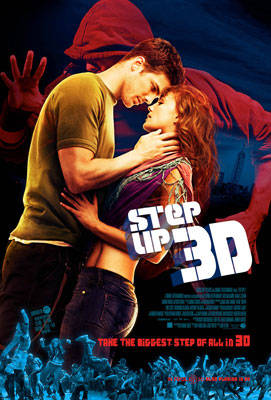
STEP UP 3D
US, 2010, 107 minutes, Colour.
Rick Malambri, Sharni Vinson, Adam G. Sevani, Alyson Stoner .
d. Jon M. Chu.
Dance movies have been popular over recent years, especially with competitions from ballroom to the streets. The British 3D film, Street Dance, made a connection between popular stomping styles and ballet. Actually, here there are two interludes from/interruptions to the Step Up group style confrontational acrobatic dancing (apart from some scenes of familiar drama that interrupt the dancing from time to time): a ballroom tango performance with the two leads and a Gene Kelly routine that reminds us of Singin' in the Rain by the two secondary leads. But, all in all, if you've seen the other two films, you've seen most of this one too.
The difference? 3D.
When 3D works well, the audience is immersed in the action. This is the advantage here. Much of the dancing is highly energised and choreographed to make the 3D have maximum effect. If you enjoy this kind of dancing, then sit, not back, but forward, with the 3D glasses, and be involved.
The story line is Step Up 101 in its familiarity. Competition, rivalries, betrayals, friendships, breaking of friendships, falling in love, competition from studies (and finals always seem to be programmed during exams that can't be missed), a champion to the rescue at the end – and victory, as if we didn't know.
The performances of the leads are serviceable. Rick Malabri looks good enough but it would seem his double did a lot of dancing. Australian Sharni Vinson has some presence and did her dancing. Adam G. Sevani from Step Up 2 shows great versatility even though his character is made to look and act like a geek. And the villain behaves in a dastardly fashion.
Colour, music, noise, movement, dance – and 3D.
1. The popularity of this kind of film, Street Dance, Step Up…? The popularity of the dense, dance, the movements, teamwork, individual skills? Competitions?
2. The New York setting, the huge warehouse for the Pirates, the film-making in the editing room? Outside the warehouse? The streets? New York University? Homes of departments?
3. The importance of the music, the style, the rhythms, the choreography?
4. The basic plot, dancing, competitions, rivalries, treachery, success? And romance?
5. Luke, his personality, as a street dancer, his crew, the Pirates? Discussions about dance, the making of the film? Leading the dense? The training? The hopes of winning the prize, paying off the debt on the building? The World Champ Finals? His finding Moose? Friendship, inviting him in? Meeting Natalie, her seeing him editing his film, encouragement? His rival, Julien? Formerly one of the Pirates? His gambling, the debts? The various heats, the Pirates and their winning? The footage and its appearing on the Internet? At least party, Julien telling Luke about her? His anger, notice of foreclosure, group disbanding? The group getting together again, Natalie joining, then victory? Natalie going to the California Station, kissing, a future in California?
6. Natalie, interested in dance, her family background, Julien her brother, bringing him up? Meeting Luke, the film? Julien asking to come back, refusal, his denouncing them? Reaction? The fixing things? Joining the group reassembled? Going to California, the kiss, accompanying Luke?
7. Moose, attending university, long distance? His love of dance? Seeing him in action? Camille as his best friend, not knowing that he was a dancer? Feeling neglect? Moose telling her about the dancing, group tdisbanding, helping to get all together again? The happy ending for Moose and Camille?
8. Julien, in the Pirates, his gambling, the clash with Luke, getting the rehearsal footage, asking his sister to spy on him, his relationship with the Natalie? His being defeated?
9. Standard characters, standard situations, the popularity of the dancing at the competitiveness, the highlights of the film, the choreography and its inventiveness – and in 3-D?
Published in Movie Reviews
Published in
Movie Reviews
Tagged under
Saturday, 18 September 2021 19:51
Step Up
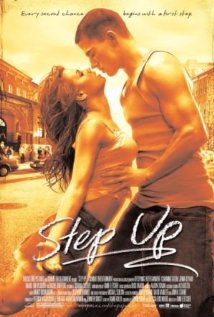
STEP UP
US, 2006, 104 minutes, Colour.
Channing Tatum, Jenna Dewan, Rachel Griffiths.
Directed by Anne Fletcher.
If one were to write a critique only of Step Up, there would be statement that none of it was original – in fact, the writer also did the screenplay for Save the Last Dance – that it had every twist and turn that dance films have, that it has every move that black and white ghetto films include, that you could even predict lines of dialogue. The point that the producers asked Michael Seresin to be the director of photography because he had filmed Fame twenty six years earlier would indicate that it is a derivative of Fame even though the same producer said that he wanted a ‘fresh take’ on the dance story.
If one were to write a review of Step Up (which this is), there would be a statement that, despite its not being original at all, it is a cheerful dance film, full of verve, despite the familiarity – and that each generation wants to do its own version of a particular style of film for its own audiences. It doesn’t particularly matter if it has been done before.
The opening credits highlight the differences in music and dance between classical ballet at a College of the Arts and rap-influenced rhythms in a club. The credits highlight the gap between rich and poor, black and white, ghetto (mentality) and affluent suburbs (mentality).
We can take it from there. Channing Tatum (She’s the Man, A Guide to recognising Your Saints) is able to be offhand and surly – and can dance as well. Jenna Dewan is driven and ambitious – and can dance too. Rachel Griffiths is the strong but reasonable principle of the college. The rest of the characters are an assorted mix of best friends, boyfriends, families and some boyz in the hood (in this case, Baltimore).
It all works out well, of course, redemption being possible through dance and affirmation. It builds up to a set piece as a grand finale and the characters step up to life.
(This is the film where Channing Tatum met Jenna Dewan – and later they married.)
1. An enjoyable dance film? In the tradition of so many dance films, variations on themes? The several sequels to this film?
2. The Baltimore setting, the worlds of the rich, of the poor? The world of dance? The School of the Arts?
3. The music, the musical score, the songs? The dance sequences? The individuals, the couples, the groups?
4. The opening and the credits sequence, the different styles of dancing, traditional, Street dance, combining the two? The styles of choreography?
5. The character of Tyler Gage? Channing Tatum’s screen presence? His age, background, idle, his friends, the two African-American? brothers, Mac and Skinny? Going to parties, stealing cars? going into the School of the Arts, the vandalism and destruction?
6. Tyler being called to account? The sentence? The hours of community service? Director Gordon and her organising him into cleaning the School of the Arts?
7. Director Gordon, her role in the Academy, authority, with the staff, with the students, with Tyler, Street-talking and discipline, with Nora? Belief in Tyler and his changing?
8. Tyler, the work, observing the dance, dancing in the parking lot? Nora seeing him?
9. Nora, a top dancer, at the School of the Arts, with Andrew her partner, his injury, the difficulties? Tyler stepping in, helping with the choreography, becoming a dancing partner, the effect on each of them?
10. The other members of the School of the Arts, Miles and Lucy, their characters, becoming friends with Tyler?
11. The buildup to the finale, competitiveness, dancing, skills, the range of music, choreography?
12. A cheerful film, a film with a touch of redemption, with a touch of love – and with plenty of dance?
Published in Movie Reviews
Published in
Movie Reviews
Tagged under
Saturday, 18 September 2021 19:51
Sunlight Jr
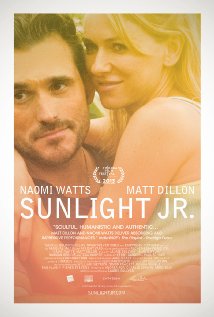
SUNLIGHT JR
US, 2013, 90 minutes, Colour.
Naomi Watts, Matt Dillon, Norman Reedus, Tess Harper, Antoni Corona.
Directed by Laurie Colyer.
Sunlight Jr is a small film, a film about ordinary people who are down on their luck in life, are not always able to make luck for themselves.
The title refers to a 24-hour small supermarket store where Melissa, Naomi Watts, works and is put upon by the tough manager with his touches of sexual harassment as well. She has been in a relationship with Justin, Norman Reedus, who comes to stalk her once the restraining order time has elapsed. Justin has a young son of his own. Melissa is in a relationship with Richard, Matt Dillon, who is a paraplegic after an accident on a building site. Also in the scene is Kathleen, Melissa’s mother, Tess Harper, a dowdy and drinking woman who takes care, with great care, of some foster children.
Most of the events in the film are fairly ordinary, the difficulties working of in the shop with the manager, especially when he put her on the graveyard shift or else she will lose her job. Melissa has to deal with Justin and his interventions, though he backs down after a fight with Richard. Melissa is pregnant, goes for an ultrasound which costs money, gets mixed reactions from Richard who wants to love the baby but is preoccupied about money, and is drinking. The harassed Melissa makes a decision about abortion. The film just stops in the aftermath, leaving the two characters, as well as the audience, wondering what will become of them.
1. A story of ordinary Americans, 21st century? Issues of finance, family, family support, disability, education and lack of education, pregnancy and abortion?
2. The Florida settings, very ordinary, the store of the title, homes, doctors’ facilities, the fishing wharves? Audiences identifying with the characters and their situations? The musical score?
3. The title, the focus on the store, the range of things sold in the store, open 24 hours, the manager and his attitudes, his superiority, talking down to Melissa, the touches of sexual harassment, Melissa and her work, Vivian, the range of customers, serving the customers, the other work of storing and throwing out goods, the graveyard shift, people depending on the manager to keep their jobs?
4. Melissa, her relationship with Richard, waking up, beginning the day, ordinary, in the car, talk, running out of petrol, Melissa walking, the unbrella, the criticism when she arrived? Richard and his day, getting his disability check, job interview possibilities? Mending electronics?
5. Melissa, her character, strong, her angers with her mother, her mother’s attitudes? The foster children? Playing with them? The past relationship with Justin, the restraining order, his coming to the shop, taunting her, his son and his relationship to him, Melissa with the boy?
6. Richard, his past work, building sites, the injury, the disability, the clashes with Justin, the love for Melissa, fighting Justin?
7. Melissa discovering she was pregnant, the tests, going to the ultrasound because of the bleeding, the amount of cash for the ultrasound? Richard, generally happy, much drinking, clashes with Justin, clashes with Melissa, upset about the money for the ultrasound? Yet wanting to be a father? Reassuring Melissa? Their clash, his driving away, who going to Justin for somewhere to stay, his refusing? Her preoccupations, going to the abortion clinic, the tests, the decision, the procedure, the consequences?
8. Melissa’s mother, dowdy, at home, hard, drinking, paying the rent and the landlord, a love for Melissa, her care for the children?
9. Melissa, her life, focus on the shop, on people? Getting the graveyard shift? Richard and his staying with her, observed by the CCTV, her being fired?
10. Melissa, Richard, possibilities for reconciliation? Her coming home, his being there, loving her? Their sitting in the car? The aftermath of the abortion? What hopes for the future?
Published in Movie Reviews
Published in
Movie Reviews
Tagged under
Saturday, 18 September 2021 19:51
Bulworth
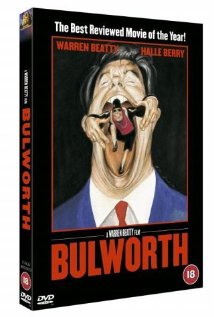
BULWORTH
US, 1998, 108 minutes, Colour
Warren Beatty, Halle Berry, Jack Warden, Oliver Platt, Paul Sorvino, Don Cheadle, Sean Astin, Michael Clarke Duncan, Nora Dunn, George Furth, Robin Gammel, Jim Hainey, Debra Monk, Laurie Metcalf, Isaiah Washington, Hart Bochner.
Directed by Warren Beatty.
American politics during the Clinton era (and public and media response to them) are characterised by hyperbole. If it all were a movie, would we believe it? Well, the movie-makers have been mirroring events with satire on spin-doctors inventing wars to distract from White House sex scandals (Wag the Dog) to a parallel with the Clinton campaign and potential sex scandals (Primary Colours). Now, Warren Beatty, a noted Democrat for decades, has now weighed in with a seemingly over-the-top (although the top seems to get higher and higher these days) satire on a senate campaign gone on the rocks in 1996 California.
Beatty co-wrote, produced, directed and stars as Senator Bulworth, emerging from nervous breakdown and setting up a contract killing on himself, to feel free to say what he likes (or, usually, rap-sing it) and expose all the cover-ups of truth and justice in political double-speak or political correctness.
There is a classy cast with Oliver Platt standing out as the increasingly anxious (and opportunist) as Bulworth gets more and more honest. Halle Berry is a hired assassin. Don Cheadle is an LA drug lord.
For a non-American audience this is a hyped presentation of hyped characters and situations that hypes our responses. Could they possibly be like this? But here is a major star cleverly undermining respect for the pseudo-respectable. But, just as we were thinking that here is a 60 year old man giving himself a leading lady in her 20s (which he does), the final moments give us an ending that jolts. A memory of the 70s comes back with Robert Altman's wonderfully broadscoped political and social satire, Nashville.
1. American politics? The 1990s? The election of 1996 and President Clinton? The Democrats?
2. Warren Beatty, story, writer, director, star? His personal contribution? His critique of American politics? His personal life and political stances and activities?
3. An LA story, eccentric, the politics, the campaigns, the Senator and his policies? His speeches to the affluent, to the Jewish community and the entertainment community? The media? The African- American community? Involvement in the drug world? Melange of the themes?
4. The title, Jay Bulworth, Warren Beatty and his style? His character, work in the Senate, his disillusionment, leading to depression, not sleeping, not eating, his being confused? His assistants? Tryiing to get him going? His contact, the arrangement about the assassination, the contract? His diary and his calendar, Murphy trying to get him to the various appointments? His feeling he had no future?
5. Bulworth his speeches, the sloppy appearance, mocking the policies, the work with the Insurance companies, with the boss, and his sinister presence at the events, his anger and disillusionment, the invitation for discussion, the deals? The speech about the arts, the Jewish leaders? His playing to the gallery with the African- American audience, the reactions, applause, the girls and their becoming groupies?
6. Nina, her being a hired for the assassination, the presence at the rallies, her friendship with the girls and groupies, the attraction to Bulworth, watching him, his watching her, following him to the various functions, her not wanting to do the assassination but to set him up? The others following Bulworth, the difference between a gunshot and a camera shot?
7. The African- American world, going to the house, the family, having the meal, getting the clothes, Bulworth and his chat? The girls, the clubs? The music, the dancing? The drugs, the politics? Nina and her brother and the drug lord having a hold over him?
8. Bulworth reviving, the phone call to cancel the assassination contract, the manager having the collapse, to the hospital, not calling off the attack, Davers having to stay with him?
9. The Bulworth team, the various plans, Murphy, his character, his gift of spin, explaining things away, the less effective assistant, the cocaine and the indulgence? Davers, his tasks, keeping an eye on Bulworth, keeping vigil over the assassination contractor? The television programmes, Bulworth and his behaviour, the insulting of the panel? The serious panellists? Larry King and his presence?
10. His clothes, with the black children, getting them ice cream instead of drugs, the police stopping, pulling the gun, his pulling his authority, their recognising him? Television and the clips? His becoming more popular?
11. His going into rap, the many rap songs, the rhymes, communicating, the media? The truth about his campaign, his criticism of false values, the themes in the rap?
12. Nina, the attempts, changing heart, changing allegiance? Bulworth watching her, inviting her to go with him, her responding?
13. His having the long sleep, coming back to normal, the invitation, in ordinary clothes – and Murphy’s reaction?
14. The news of his election, looking dapper, with Nina, the contrast with his wife, the strained relationship, her presence at the various functions – and her having a lover?
15. The drug lord, his role in the district, Nina’s brother, talking with Bulworth, seeing the political angle and following it?
16. The assassins, and the finale with Bulworth being shot? The grim ending with the touch of the cynical?
Published in Movie Reviews
Published in
Movie Reviews
Tagged under
Saturday, 18 September 2021 19:51
Carriers
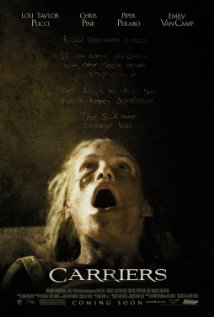
CARRIERS
US, 2009, 84 minutes, Colour.
Lou Taylor Pulci, Chris Pine, Piper Perabo, Emily Vancamp, Christopher Meloni.
Directed by Alex Pastor, David Pastor.
Carriers is a small budget post-apocalyptic story, filmed in 2006 but left on the shelf until 2009, until the popularity of Chris pine in Star Trek.
The film is the work of two Spanish brothers, Alex and David Pastor. They have a simple screenplay: a post-apocalyptic devastation of the United States by a virus, four young people travelling across the country to avoid the virus, encountering a father and daughter, the daughter being infected. The hospital they hope to go to has been closed and has no cure. The group goes to an old country club where they are set upon by a gang of survivalists. One of the group is infected and is ousted. There is an incident where the leader of the group shoots a couple to take the petrol from their car. He himself is wounded and his younger, more quiet, brother, struggles with him and kills him. The two remaining survivors and up on a beach, and it is not clear whether this is a despairing ending or they have some hope.
1. The title? The situation? The virus? The apocalyptic destruction? The spread of the virus? The ending – bleak or hopeful?
2. The locations, the trip across the United States, the car and the need for gasoline, the gang of survivalists, the hope for the hospital, closed down, deaths, violent behaviour and murder? Post-apocalyptic story?
3. No explanation given about the background? The audience immersed immediately in the action with the four?
4. The credits, the home movies, the characters in happier times? The musical score?
5. The four, relationships, the two brothers, from happy to bickering? To death? Brian, his age, leadership? Relationship with Bobby? Danny, younger, quieter, relationship with Kate?
6. The travel, their hopes to avoid the virus? The encounter with Frank and Jodie, father and daughter, concern? Going to the hospital advertising the cure,
its being closed down, no cure, failure?
7. Bobby, interaction with Jodie, the infection?
8. The survivalist gang, the attack, the group in the country club? Bobby and the infection, her being ousted?
9. Brian, his treatment of Bobby, harsh?
10. The couple in the car, with gasoline, Brian killing them, his being wounded?
11. Daniel and Kate, Daniel taking control, Brian and the struggle, Daniel killing him?
12. Daniel and Kate, arrival at the beach, desolate – or some hope?
Published in Movie Reviews
Published in
Movie Reviews
Tagged under